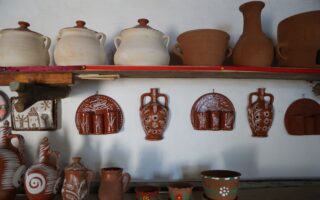On the Greek island of Lesbos, Dimitris Kouvdis keeps an ancient pottery tradition alive. Shunning modern machinery, he crafts his pieces with local clay and fires them in a traditional kiln, a testament to his dedication to preserving cultural heritage.
His UNESCO-recognized work is a celebration of historical craftsmanship and a powerful statement against the homogenization of craft in the age of industrial production.
On the picturesque Greek island of Lesbos, master potter Dimitris Kouvdis, age 70, breathes life into ancient pottery techniques, recognized by UNESCO's National Inventory of Intangible Cultural Heritage. In his scenic workshop, he single-handedly preserves a tradition once flourishing in the pottery hub of Mandamados.
Kouvdis's work stands out as some of the last Mediterranean pottery crafted from local clay and fired in a traditional olive-pit-fueled kiln. The pottery’s distinctive designs, painted with natural lime, are the signature of Kouvdis’s enduring artistry, recently honored by UNESCO.
While modern mechanization has transformed the craft, Kouvdis remains devoted to the slower, more passionate methods of the past. "Mechanization lacks continuity," he explains, carefully shaping each piece on his secluded plot overlooking the Aegean Sea.

